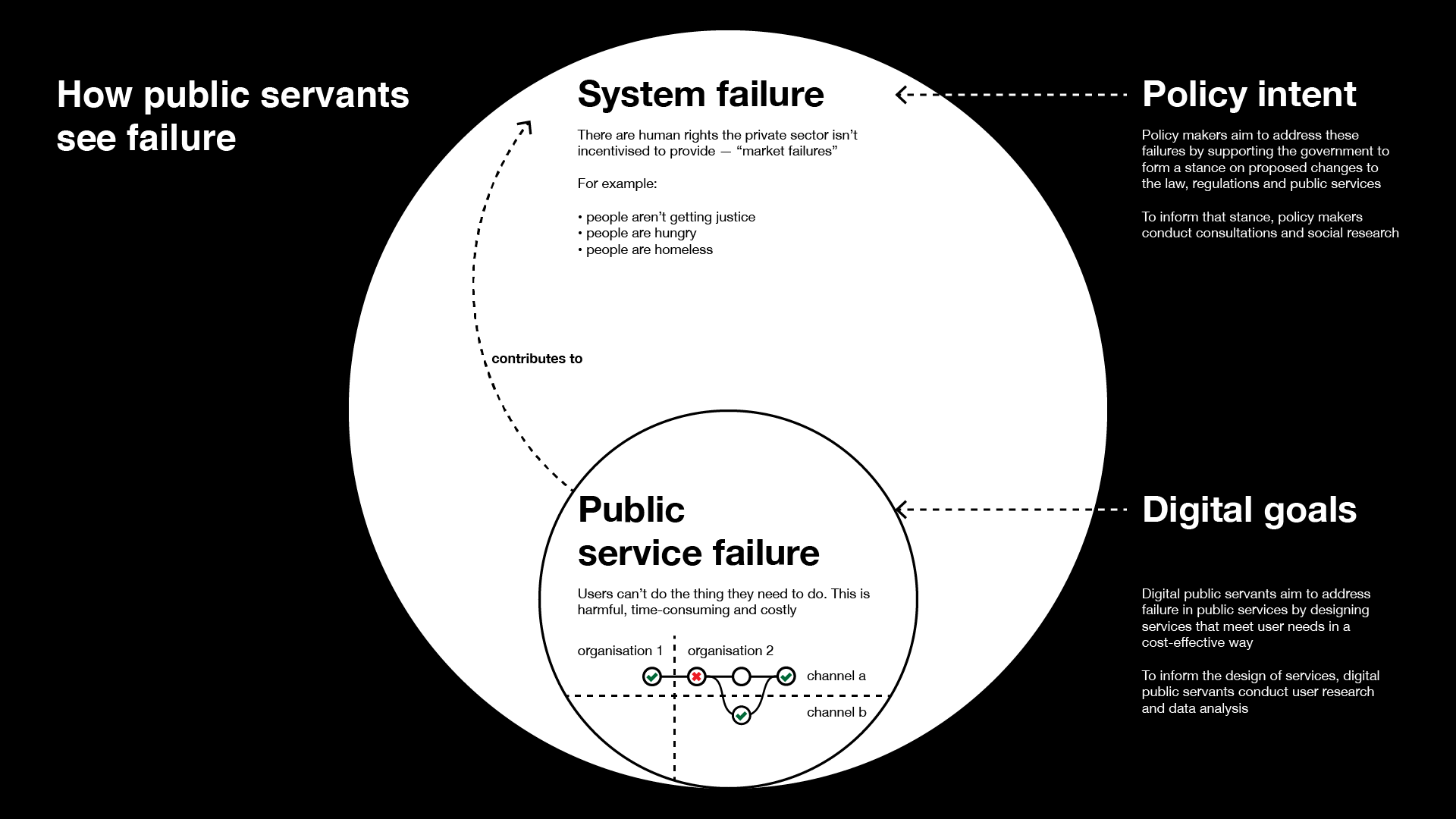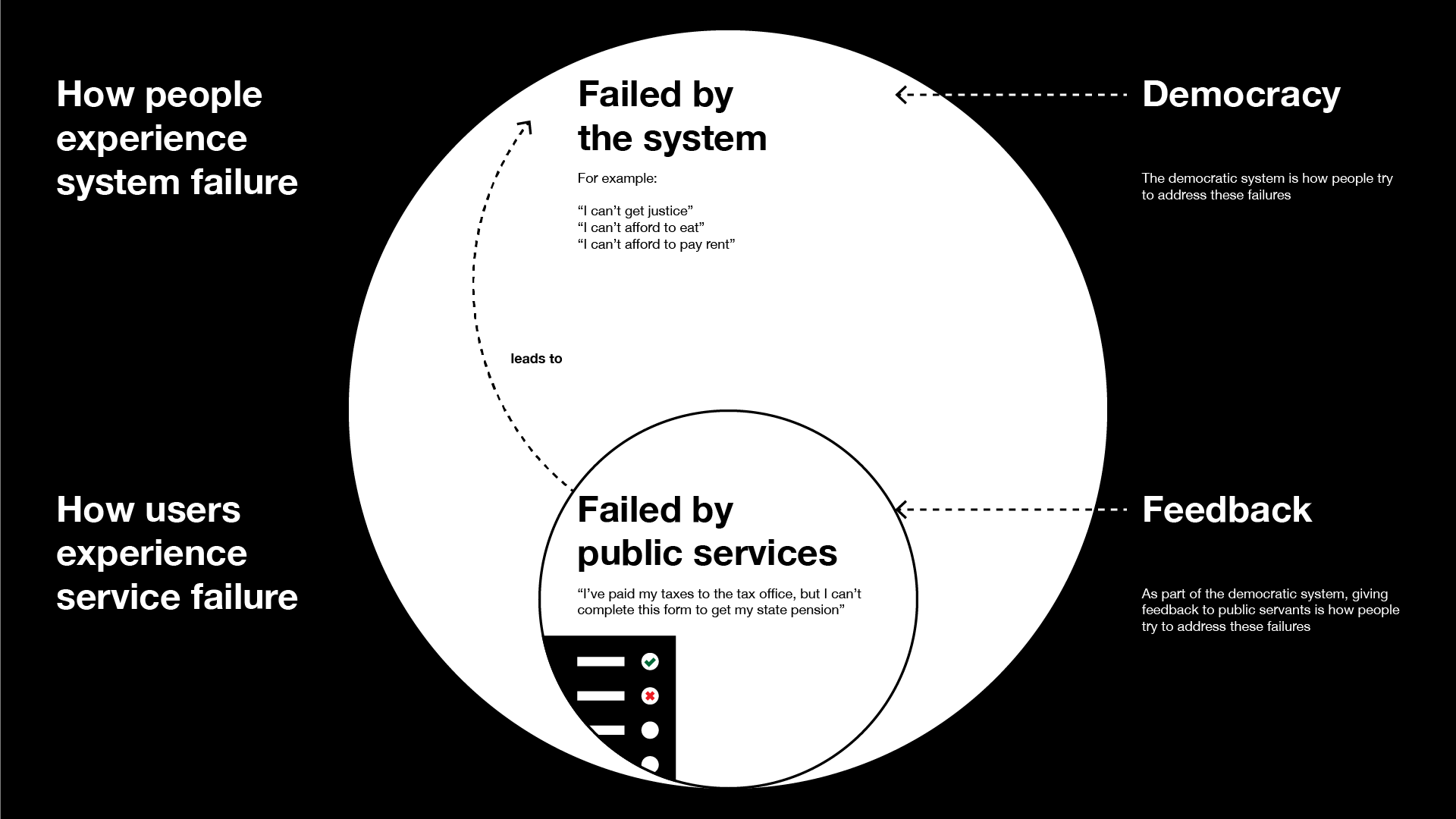Digital people trying to influence policy — be humble or eat humble pie
Collaboration Sketching Policy Systems Service failure FailureService failure contributes to failure in the system we live in, but there are many other contributors. Recognising this helps digital specialists to work more humbly with policy makers. Without humility, digital specialists will fail when trying to influence policy makers.
In 2017, Paul Maltby wrote, 'Democracy > user needs'. Between then and now, I have repeatedly bounced between disagreeing and agreeing with the statement.
After observing some user research with civil servants, I now hold a more nuanced view. In summary:
'User needs are a part of a democracy'
Why this matters
Many in the digital community believe that service failure is often caused by bad policy. To address this, digital specialists are trying to collaborate with policy makers. This happens either through various policy labs or when service owners support more effective collaboration between the policy and delivery cycles.
Sometimes, digital people enter this collaboration hoping to help shape better policy by giving policy makers a better understanding of user needs. It's a good intention, but our user research with civil servants revealed that this approach mostly fails. This approach doesn't consider the different scales of failure policy makers are trying to address compared to digital specialists.
Different scales of failure public servants are trying to address

Public servants are generally trying to address failure in the system we live in. There are human rights the private sector isn't incentivised to provide, sometimes referred to as "market failures". For example:
- people aren't getting justice
- people are hungry
- people are homeless
To address system failure, policy makers support the government to form a stance on proposed changes to the law, regulations and public services. To inform that stance, policy makers conduct consultations and social research.
A subset of public servants are trying to address public service failure. Service failure is a subset of wider system failure. In this subset of public servants, digital specialists see failure as users not being able to do the thing they need to do. This sort of failure is harmful, time-consuming and costly.
To address service failure, digital public servants design services that meet user needs in a cost-effective way. To inform the design of services, digital public servants conduct user research and data analysis.
System and service failure are seen at two very different scales. Although failure in public services contributes to failure in the system we live in, there are many other contributors. It's humbling for digital specialists to recognise this when trying to influence policy.
Different scales of failure people experience

When people are failed by the system we live in, they experience big problems. For example:
- "I can't get justice"
- "I can't afford to eat"
- "I can't afford to pay rent"
The way people address the big problems is through the democratic system.
When people are failed by public services, they experience comparatively smaller problems. For example:
"I've paid my taxes to the tax office, but I can't complete this form to get my state pension."
This is an example of service failure.
The way people address the comparatively smaller problems is through a smaller part of the democratic system; users can give feedback to public servants so they can try to address service failure.
Sometimes, people experience big problems because they were failed by public services. They also experience big problems because of many other contributors to wider system failure.
What this means for public servants
If you're a digital specialist trying to influence policy makers, it's important to recognise that you are addressing failure at a much smaller scale. This recognition will make you humble, and help collaboration last longer than a workshop.
If you're a policy maker trying to shape more effective policies, it's important to recognise that failure in public services contributes to failure in the system we live in. Policies can both positively and negatively affect failure in public services. Collaborating with specialist digital colleagues can help you understand the system-wide impact of service failure, and how you can shape policies that help to address this.
Thanks to Lina Nilsson, Leon Hubert, Leighton Mitchell, Dilan Saujani, James Lubwama, Jacinta Mellenger, Dr Salma Patel, Mark Dalgarno and Paulina Gonzalez-Ortega for all helping me learn enough to write this blog post.
Next: Good services can support bad policies, and bad services can support good policies. It's messy